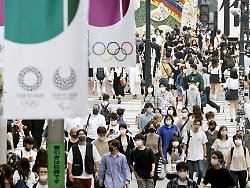Wednesday 07 July 2021
But no doubts about the event
Japan is likely to declare a state of emergency for the Olympics
The official news is still pending, but the evidence is clear: the Olympic Games in 2021 will apparently take place without spectators after all. In Japan, the number of infections is rising again, and a renewed declaration of the state of emergency is becoming more and more likely.
The first ghost games in Olympic history are becoming more concrete: The Japanese government under Prime Minister Yoshihide Suga wants to declare a corona emergency again during the summer games in Tokyo. Several media in the country reported unanimously about the government’s plans.
“The number of infected people in Tokyo is increasing. We will take thorough measures to contain infections based on data such as the number of people infected and the occupancy of hospital beds,” Suga told reporters after the meeting. In Japan, the number of infections is picking up again a good two weeks before the opening ceremony on July 23. Today, Wednesday, 920 new cases were reported for the capital, the highest since May 13 (1010).
The new emergency measures are expected to apply until August 22nd, beyond the end of the games on August 8th. It is the fourth corona emergency for Tokyo. It should also apply to up to five other prefectures. The measures could have a significant impact on the organizers’ audience plans. The Japanese news agency Kyodo News reported, citing a senior government official, that it was now likely that the Olympics would take place behind closed doors.
In June a limit of 10,000 fans or half the capacity of each venue was set, but always with reservations. In view of the tense corona situation, however, games in camera have recently come into focus again. Overseas fans were excluded from the mega event weeks ago.
Olympic torch disappears from public roads
The state of emergency in the capital was recently lifted. Instead, by July 11, the government had imposed so-called “quasi-emergency measures” in Tokyo, Osaka and five other prefectures. These restricted, for example, the sale of alcohol and the opening times of bars and restaurants.
The official decision of the politicians on the renewed state of emergency for the metropolis is expected on Thursday tomorrow. IOC President Thomas Bach is expected in the Olympic city on the same day. Bach was originally supposed to travel to Tokyo in May, but this project was postponed for various reasons. Numerous athletes, such as rowers and boxers from Germany, are already in Japan. A total of 11,000 athletes from more than 200 countries take part in the games in Tokyo. The IOC in particular had categorically ruled out another rejection.
It was also announced that the Olympic torch will be completely banned from public streets after arriving in Tokyo on Friday. The fire should only be presented at inaccessible events. Small private ceremonies are planned every day at the last place of the relay race.
The torch relay began on March 25th in Japan and was originally intended to pass through all 47 prefectures of the country on the way to the opening ceremony in the new Olympic Stadium. However, due to the infection situation, the project could only be carried out with obstacles, numerous prefectures prohibited the fire from running through their area or did not allow fans on the streets.
.
